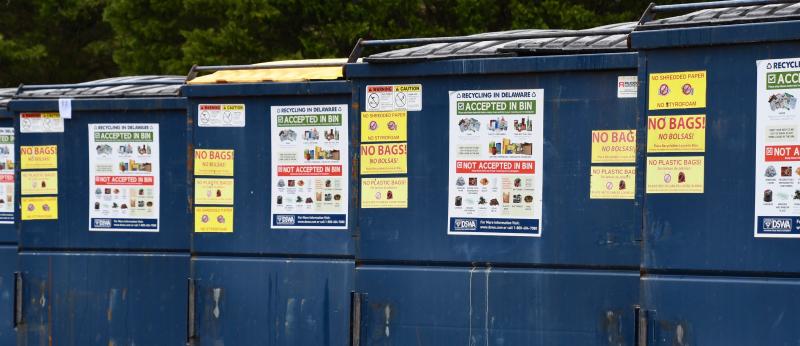Amid a worldwide pandemic is strange time to celebrate the 50th anniversary of Earth Day April 22.
Yet, even after five decades the impetus behind that first Earth Day remains the same today: Recycle, reuse, reduce.
Although we can still achieve the three Rs, it's become a little more challenging during the COVID-19 crisis.
As we struggle with what to do with plastic bags, nearly all grocery stores no longer allow shoppers to use their own bags.
With more time on our hands, many of us are cleaning out closets. Yet, we have no place to donate clothes or household items because thrift stores, considered nonessential, are closed.
Still, even in a time of isolation, we can take steps to recycle, reuse and reduce.
Consider the following from the Keep America Beautiful organization:
• If you or someone in your home has tested positive for coronavirus, do not recycle; place items in a bag that is securely closed and discard them in a trash container. This also applies to any used cleaning supplies, paper towels, tissues, or personal protective equipment used in a home or business with someone who has tested positive.
• Most cleaning supplies can be recycled with pumps and spray heads removed. For lotion bottles and other toiletry items with pumps, empty the contents, discard the pump and recycle the bottle. For nonpump containers, empty the contents, rescrew the cap and recycle.
• Recyclables need to be dry and free of food. Reduce waste by using all the product in a container, then lightly rinse and recycle it. For empty plastic beverage containers, leave the cap on and recycle. Empty aerosol cans – deodorant, hairspray and sunscreen – can be recycled with other aluminum or steel cans.
• Home items that can be recycled include toilet paper rolls, paper towel rolls, empty cleaning supply containers, kitchen plastics, clean and dry cardboard and paper goods, including cereal boxes and shipping boxes.
A personal perspective
Recycling has not always been what it is today. When I was growing up, the only thing being recycled by residents was alumninum cans.
That's where I first got interested in recycling, which was boosted by the first Earth Day in 1970.
Although I was aware of the first Earth Day as a freshman at Seaford High School, it wasn't until the third Earth Day that I mobilized classmates to get involved in a project. Dozens of us fanned out over the countryside and picked up cans to recycle.
We never dreamed just how big the project would get as the family backyard quickly filled with hundreds of bags of cans. When we finished, we over filled a dump truck that pulled in our driveway to take the cans away to be recycled. Benefits from the sale of the cans helped provide funds for our prom.
Later in life, I spearheaded an effort to set up a recycling center in the City of Seaford. Believe me, it wasn't as easy as it sounds. Even as a city councilmember, I had to work hard to convince city officials it could work and pay for itself. This was long before any town or city had recycling centers, and it was hard to find a company to pick up the cans, plastic and paper. It worked well for several years until Delaware Solid Waste Authority came into existence.
That one act of curbside single-stream recycling by DSWA is one of the most significant environmental measures ever taken in this state.
It's helped all of us live by the motto: “Think globally, act locally.”
DSWA offers other recycling services as well, including yard waste, electronics, household batteries and waste oil. Go to dswa.com for more information and locations where recyclables can be taken.




















































